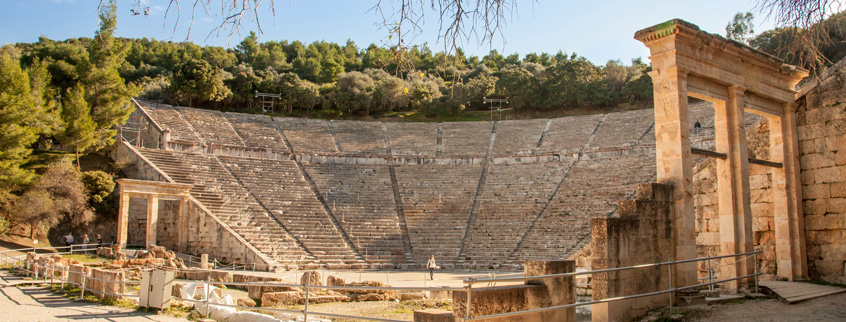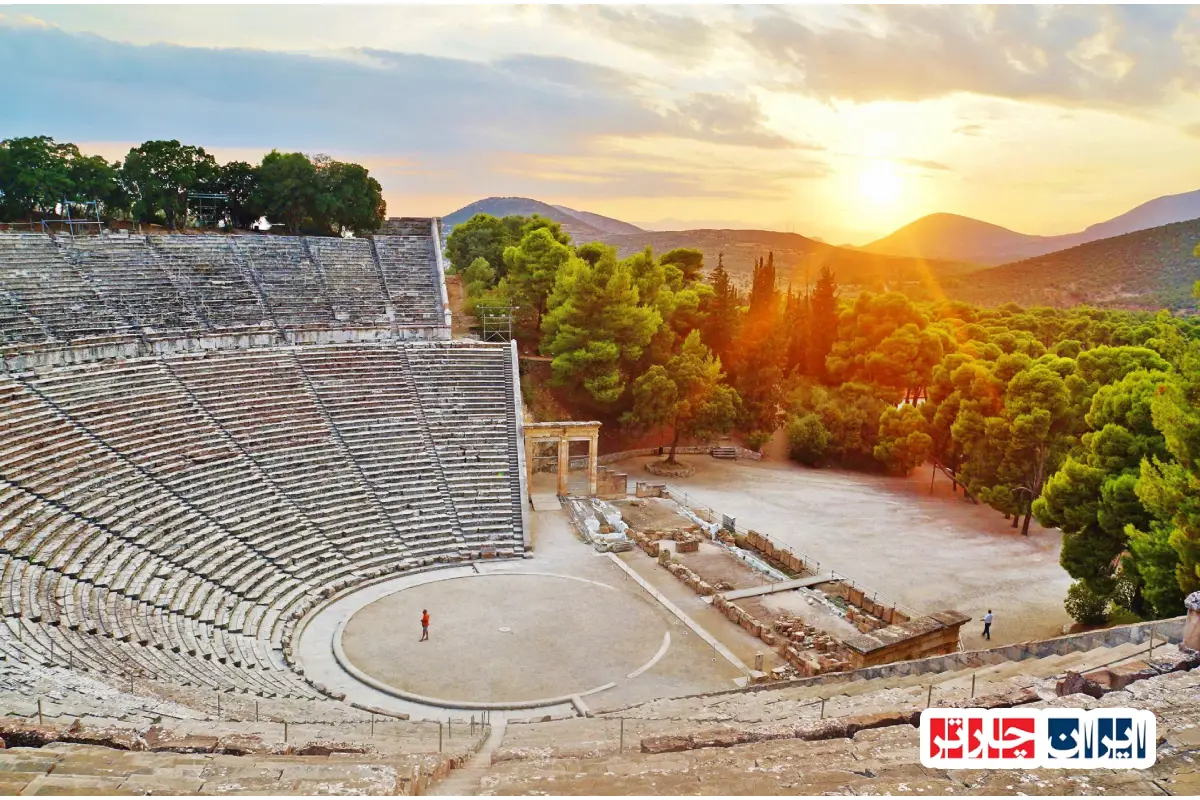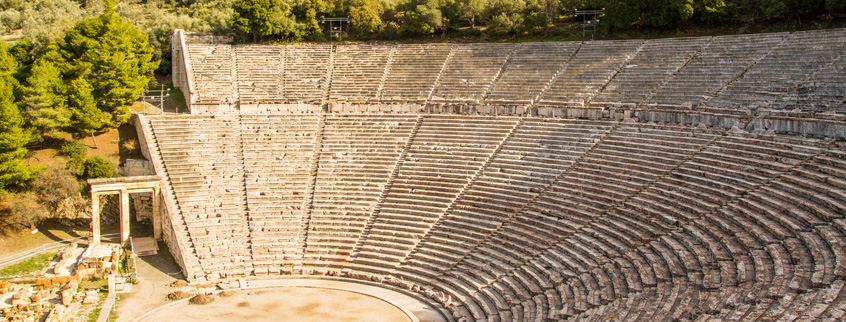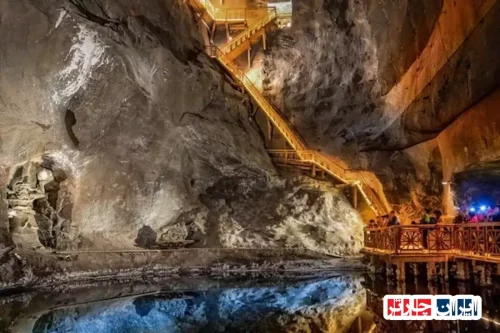Discover the Rich Heritage and Architectural Marvels of Epidaurus Peloponnese Greece
Epidaurus Peloponnese Greece stands as a testament to ancient Greek ingenuity, blending historical significance with breathtaking architecture. Located in the heart of the Peloponnese, this remarkable site is renowned worldwide for its ancient theater, which exemplifies perfect acoustics and harmonious design. Visitors to Epidaurus Peloponnese Greece can explore a multitude of archaeological wonders, including the ancient healing center and well-preserved ruins that narrate stories from centuries past. The region’s natural beauty, combined with its cultural treasures, makes Epidaurus Peloponnese Greece a must-visit destination for history enthusiasts and travelers seeking authentic Greek heritage. To learn more about this extraordinary site, visit Epidaurus-Iran Charter. Experience the magic of Epidaurus Peloponnese Greece and immerse yourself in the rich history, stunning architecture, and vibrant culture that define this iconic Greek landmark.

Discover the Rich History of Epidaurus Peloponnese Greece: From Ancient Healing Temples to Modern Cultural Landmark
Epidaurus Peloponnese Greece stands as a testament to ancient Greek civilization, renowned for its historic healing temples and impressive theater. This site, nestled amidst lush landscapes, has been a center of spiritual and medical practices since antiquity. Its origins trace back to the classical period when it served as a sanctuary dedicated to Asclepius, the god of medicine, attracting pilgrims seeking cures and spiritual renewal. Over centuries, the site evolved, blending religious rituals with cultural festivities that continue to fascinate visitors today.
Throughout history, Epidaurus Peloponnese Greece has played a pivotal role in shaping Greek cultural identity. The ancient healing centers, combined with the sophisticated architecture of the theater, reflect the ingenuity and spiritual depth of the Greeks. Today, this archaeological site is a UNESCO World Heritage monument, symbolizing the enduring legacy of Greek innovation in medicine, arts, and architecture. Its historical significance continues to draw scholars, tourists, and history enthusiasts from around the world.
Modern excavations and restorations have uncovered many secrets of this ancient site, revealing its complex layout and sophisticated engineering. The ongoing preservation efforts ensure that future generations can experience the grandeur of Epidaurus Peloponnese Greece firsthand. Visitors can explore the ancient ruins, walk through the reconstructed structures, and imagine the vibrant ceremonies that once took place here, making it a must-visit destination for history lovers and cultural explorers alike.
The Architectural Marvel of Epidaurus Theater in Peloponnese Greece: Engineering and Artistic Excellence
The theater of Epidaurus Peloponnese Greece is celebrated worldwide for its exceptional acoustics and harmonious proportions. Built in the 4th century BC, this ancient structure exemplifies Greek mastery in architecture and engineering. Its design incorporates precise mathematical ratios, ensuring perfect sound distribution across all seating areas, allowing even the faintest whispers to be heard clearly from the back rows. This acoustic marvel remains a benchmark for modern theater design.
The theater’s construction utilized local limestone and marble, carefully carved and assembled without the use of mortar. Its semi-circular shape and tiered seating provide optimal visibility and comfort for spectators. The integration of natural landscape with the structure demonstrates the Greeks’ deep understanding of harmony between architecture and environment. Today, the theater continues to host performances, showcasing its timeless functionality and artistic brilliance.
Beyond its technical features, the theater of Epidaurus Peloponnese Greece embodies aesthetic elegance. The symmetry, proportion, and craftsmanship reflect the high standards of ancient Greek artisans. This site not only highlights architectural innovation but also serves as an enduring symbol of Greek cultural achievement, inspiring architects and engineers worldwide.
Epidaurus Peloponnese Greece’s Amphitheater: A Perfect Blend of Nature and Ancient Engineering
Perched amidst the scenic hills of Peloponnese Greece, the Epidaurus amphitheater is a masterpiece of ancient engineering and natural harmony. Its location within a lush landscape enhances the acoustic properties and provides a stunning backdrop for visitors. The amphitheater’s design capitalizes on the natural slope of the terrain, reducing construction effort while maximizing sound clarity and audience capacity.
The amphitheater features 54 rows of seats, accommodating thousands of spectators, all enjoying clear sound without modern amplification. The precise alignment of seating, stage, and surrounding landscape demonstrates the Greeks’ sophisticated understanding of acoustics and spatial design. This seamless integration of nature and architecture makes the amphitheater a unique example of sustainable ancient construction.
Today, the amphitheater hosts cultural events, including theatrical performances and concerts, attracting audiences from around the globe. Its natural setting and historical significance make it a prime destination for those seeking an authentic experience of ancient Greek culture combined with breathtaking scenery. Visiting this site offers a glimpse into the ingenuity of ancient architects and the enduring beauty of Greek heritage.
The Cultural Significance of Epidaurus Peloponnese Greece: From Ancient Rituals to Contemporary Festivals
Epidaurus Peloponnese Greece was once a vibrant hub of religious, medical, and cultural activity. The site’s temples and healing centers served as pilgrimage destinations, where ancient Greeks sought cures and spiritual enlightenment. The theater hosted dramatic performances linked to religious festivals honoring Asclepius, blending entertainment with spiritual rituals that reinforced community bonds.
Today, the site continues to be a center of cultural celebration. Annual festivals featuring performances in the ancient theater revive the spirit of antiquity, attracting artists and audiences worldwide. These events preserve the theatrical traditions of Greece, fostering a deep appreciation for its artistic heritage. The ongoing use of the site for cultural festivals underscores its importance as a living monument of Greek history and arts.
Moreover, Epidaurus Peloponnese Greece plays a vital role in promoting Greek culture globally. Educational programs, guided tours, and theatrical performances help visitors connect with the rich history and artistic achievements of ancient Greece. This continuous cultural relevance ensures that the legacy of Epidaurus remains vibrant and influential in modern times.
Exploring the Natural Surroundings of Epidaurus Peloponnese Greece: Scenic Landscapes and Local Villages
The region surrounding Epidaurus Peloponnese Greece boasts picturesque landscapes, including rolling hills, lush forests, and pristine beaches. These natural features create an idyllic setting for visitors seeking relaxation and scenic beauty. Nearby villages offer authentic Greek hospitality, with traditional tavernas, local markets, and charming architecture that reflect the region’s cultural heritage.
Nature lovers can enjoy hiking trails that wind through the hills, providing stunning views of the coastline and the ancient site itself. The nearby beaches offer opportunities for swimming, sunbathing, and water sports, making the area a versatile destination for diverse interests. The combination of historical sites and natural beauty makes this region a comprehensive travel experience.
Travelers can also explore local farms and vineyards, tasting regional wines and products that showcase the area’s agricultural richness. The harmonious blend of history, nature, and local culture makes the surroundings of Epidaurus Peloponnese Greece an essential part of any visit, enriching the overall experience with authentic Greek charm and scenic tranquility.
Modern-Day Epidaurus Peloponnese Greece: Festivals, Performances, and Cultural Events
Today, Epidaurus Peloponnese Greece is a lively cultural hub, hosting annual festivals that celebrate its ancient heritage. The most prominent event is the summer theater festival, where performances are staged in the historic amphitheater, recreating the theatrical traditions of ancient Greece. These performances attract audiences from around the world, eager to experience history come alive.
In addition to theater, the site hosts concerts, dance shows, and cultural exhibitions, transforming the ancient space into a vibrant venue for contemporary arts. Workshops and educational programs are organized to engage local communities and visitors, fostering a deeper understanding of Greek history and culture. These events ensure that Epidaurus remains a dynamic center of artistic expression.
Participating in these festivals offers visitors a unique opportunity to connect with Greece’s artistic roots while enjoying modern entertainment. The combination of historical ambiance and contemporary performances makes Epidaurus Peloponnese Greece a must-visit destination for cultural enthusiasts seeking authentic Greek experiences in a spectacular setting.
Practical Tips for Visiting Epidaurus Peloponnese Greece: Access, Best Times, and Visitor Guidelines
Reaching Epidaurus Peloponnese Greece is convenient via major roads from Athens and other cities, with options for guided tours or self-driving. The site is open year-round, but the best time to visit is during spring and early summer when the weather is mild and the landscape is lush. Early mornings or late afternoons offer cooler temperatures and fewer crowds for a more enjoyable experience.
Visitors should wear comfortable shoes suitable for walking on uneven surfaces and bring sun protection, water, and camera gear to capture the breathtaking scenery. Entrance fees vary depending on the season and events, so it’s advisable to check current prices and opening hours beforehand. Guided tours can enhance understanding of the site’s history and architecture, providing valuable insights.
Respect for the archaeological site is essential; avoid touching or damaging structures, and follow all guidelines provided by staff. Planning ahead ensures a smooth visit, allowing you to fully appreciate the historical and cultural significance of Epidaurus Peloponnese Greece and create memorable experiences during your trip.
The Global Importance of Epidaurus Peloponnese Greece: A UNESCO Heritage Site and Cultural Icon
Epidaurus Peloponnese Greece holds a prominent place in world heritage, recognized for its exceptional contribution to ancient Greek culture and architecture. As a UNESCO World Heritage site, it exemplifies the artistic and engineering prowess of the Greeks, influencing architectural design across civilizations. Its preservation is vital for maintaining the cultural legacy of Greece and humanity.
The site’s significance extends beyond its historical value; it embodies the enduring human pursuit of harmony between art, science, and spirituality. The theater’s innovative acoustics and aesthetic beauty continue to inspire architects and performers worldwide. Protecting this heritage ensures that future generations can experience the grandeur of ancient Greece and its contributions to global culture.
Through ongoing conservation efforts and international cooperation, Epidaurus Peloponnese Greece remains a symbol of cultural excellence. Its status as a UNESCO site highlights the importance of safeguarding such treasures, fostering appreciation for ancient innovations that continue to influence modern society. Visiting this site offers a profound connection to the roots of Western civilization and the universal human spirit of creativity and discovery.
What Visitors Say About Epidaurus Peloponnese Greece: Experiences, Photos, and Personal Insights
Travelers who visit Epidaurus Peloponnese Greece often describe their experience as awe-inspiring, especially the acoustics of the ancient theater and the scenic surroundings. Many share photos capturing the harmony of the stonework and the natural landscape, emphasizing the site’s timeless beauty. Visitors frequently mention the sense of stepping back in time and feeling connected to ancient Greek culture.
Personal stories include attending performances in the theater, exploring the ruins, and enjoying the peaceful atmosphere of the nearby countryside. These testimonials highlight the emotional impact of standing in a space that has hosted thousands of years of history and cultural expression. Such shared experiences help promote the site’s significance and attract more visitors eager to create their own memories.
Engaging with visitor feedback and photos enhances the appreciation of Epidaurus Peloponnese Greece as a living monument. It encourages others to explore its wonders, ensuring that the legacy of this ancient site continues to inspire and educate people worldwide. Personal insights and visual stories serve as powerful tools for promoting cultural tourism and preserving this extraordinary heritage.

Frequently Asked Questions About Epidaurus Peloponnese Greece
- What is the historical significance of Epidaurus in Greece?
- Epidaurus is renowned for its ancient healing temples dedicated to Asclepius, the god of medicine. It served as a major spiritual and medical center in antiquity, attracting pilgrims seeking cures and spiritual renewal. Its well-preserved ruins and theater highlight the cultural and religious importance of the site in ancient Greece.
- How old is the Epidaurus Theater, and why is it famous?
- The Epidaurus Theater was built in the 4th century BC and is celebrated worldwide for its exceptional acoustics and harmonious proportions. Its design incorporates precise mathematical ratios, allowing even the faintest sounds to be heard clearly from the back rows, making it a marvel of ancient engineering.
- What makes the Epidaurus Amphitheater unique?
- Perched amidst scenic hills, the amphitheater seamlessly blends natural landscape with ancient architecture. Its location on a natural slope enhances acoustic properties and provides stunning views. It features 54 rows of seats that accommodate thousands of spectators without modern amplification, showcasing ancient Greek ingenuity.
- How does Epidaurus reflect Greek cultural heritage?
- Epidaurus was a hub for religious rituals, healing practices, and theatrical performances, embodying the spiritual and artistic achievements of ancient Greece. Its temples, theater, and healing centers played vital roles in shaping Greek cultural identity and continue to inspire today.
- What are the main natural attractions near Epidaurus?
- The surrounding region features lush hills, forests, and pristine beaches. Visitors can enjoy hiking, water sports, and exploring traditional villages with authentic Greek hospitality. The scenic landscapes complement the historical site, offering a well-rounded travel experience.
- Are there cultural events held at Epidaurus today?
- Yes, the site hosts annual festivals, especially during summer, where performances are staged in the ancient theater. These events revive Greek theatrical traditions and attract audiences worldwide, making the site a vibrant cultural hub.
- What are some practical tips for visiting Epidaurus?
- Plan your visit during spring or early summer for mild weather. Wear comfortable shoes for uneven terrain, bring sun protection, water, and a camera. Check opening hours and ticket prices in advance, and consider guided tours for a richer understanding of the site.
- How is Epidaurus protected as a UNESCO World Heritage Site?
- Ongoing conservation and restoration efforts ensure its preservation. International cooperation and strict guidelines help maintain its structural integrity and historical authenticity, allowing future generations to appreciate its significance.
- What do visitors say about their experience at Epidaurus?
- Many describe feeling awe when experiencing the theater’s acoustics and exploring the ruins. Photos often highlight its timeless beauty, and visitors share stories of cultural immersion, making it a memorable destination for history and culture enthusiasts.
- Can I attend performances at Epidaurus today?
- Yes, during the summer festival season, performances are held in the ancient theater. Tickets should be purchased in advance, and attending a show provides a unique opportunity to experience Greek theatrical traditions in a historic setting.
- What is the best way to reach Epidaurus?
- The site is accessible by road from Athens and other major cities. Guided tours, car rentals, or organized transfers are available. Visiting early in the day or late afternoon helps avoid crowds and enjoy cooler temperatures.
- Why is Epidaurus considered a symbol of Greek cultural achievement?
- Its architectural innovation, spiritual significance, and role in ancient Greek society make it a lasting symbol of Greece’s artistic and scientific advancements. Its preservation underscores the importance of cultural heritage and human ingenuity.
- What are some tips for photographers visiting Epidaurus?
- Capture the theater during golden hours for optimal lighting. Use wide-angle lenses to showcase the landscape and architecture. Respect the site’s rules, avoid flash photography, and focus on framing the harmony between natural surroundings and ancient structures.
- How does Epidaurus contribute to modern Greek culture?
- It continues to host cultural festivals, theatrical performances, and educational programs that promote Greek heritage. The site serves as a bridge between ancient traditions and contemporary arts, inspiring new generations of artists and scholars.
- What should I keep in mind to preserve the site during my visit?
- Follow all guidelines, avoid touching or damaging structures, and dispose of trash properly. Respect the historical integrity of the site to help ensure its preservation for future visitors.

























